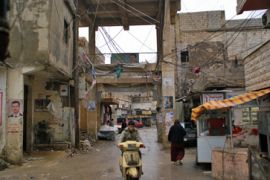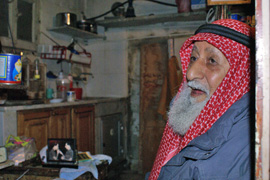Lebanon vote weighs on Palestinians
Palestinian refugees explain the importance to them of Lebanon’s presidential polls.

 |
| Khaled captains a Palestinian security force in Bourj el-Barajneh refugee camp |
As Lebanese politicians hold last-gasp meetings to agree on a consensus presidential nominee who can then be voted into power, people remain fearful that the two main political blocs will fail to reach a compromise.
While the March 14 majority bloc wants to be able to vote on its preferred candidate, some members of that bloc feel they are being forced into accepting a nominee favourable to the Hezbollah-led opposition, known as March 8.
Lebanon should have a new consensus president by Friday. If the vote fails, March 14 could elect a president by a simple majority – a solution that will not be accepted by March 8 and its supporters.
But another community that will be affected by the outcome of Lebanon’s presidential vote is the group of Palestinian refugees living in 12 camps dotted around the country.
| Special report |
Living in Lebanon without financial assistance from the state and without citizenship, they feel marooned from ordinary Lebanese, yet also party to the political machinations ahead of the presidential vote.
“I am waiting for this election more than the Lebanese,” Khaled, a captain of a Palestinian security force in Beirut’s Bourj el-Barajneh refugee camp, told Al Jazeera.
“I can only hope they reach a deal – it doesn’t matter which president gets to power in Lebanon. All we want is someone who can provide stability for us here.”
The Aoun vote
Other people in Bourj el-Barajneh have a definite idea on who they would like to see in power.
 |
| Saadi Yassine knows who she wants as president |
“Michel Aoun was the head of the Lebanese army once and he will provide security,” Saadi Yassine, a woman in the camp, says.
Aoun is the preferred presidential candidate of the March 8, which is led by Hezbollah, a Lebanese political party that has a resistance movement against Israel.
Unsurprisingly, others in the camp express hope that Aoun will become president and help solidify Hezbollah’s right to bear arms against Israel, which caused many Palestinians to flee to Lebanon in the first instance.
Palestinian opinion on Aoun and March 8 is in sharp contrast to the March 14 majority, which the people Al Jazeera interviewed in Bourj el-Barajneh feel is Western-backed.
“Let the March 14 go to Paris or Washington. I am for the resistance and those who support it,” Ahmad el-Jashi, a young man in the camp, says.
For Palestinian political representatives in Lebanon, however, it is not so easy to dismiss the March 14 majority.
In exclusive interviews with Al Jazeera, senior representatives of three major Palestinian groups in Lebanon said they had to work with all parties in the Lebanese political system – regardless of who eventually becomes president.
Pragmatism
“We have good contact with the Lebanese army, and we have good contact with the Lebanese security agencies, all of them, but the current situation in Lebanon is not good for us,” Khaled Arref, a senior representative from Fatah, said from his home in Sidon.
“We are guests here in Lebanon. We are Palestinians, not Lebanese. But sure, we would like a president who can protect our rights as human beings in Lebanon,” he said.
|
Your Views |
|
Priamsend, Clovis, USA
|
Hamas’s representative in Lebanon said that Palestinians in the camps were hoping to get a Lebanese president who supports their right to return to their homeland and who would help provide security and basic services in the camps.
“I think they would like to see a Lebanese president who supports the right of return, especially when Palestinians believe there is some kind of American pressure to prevent [that],” Usamah Hamdan said in Beirut’s Haret Hreik district, the heart of Hezbollah support in the Lebanese capital.
“Everyone knows that Palestinians here are prevented from work and that they cannot own their own house. They face serious troubles in receiving health treatment and schooling.
“They want a president who can work with the Lebanese government to improve those things.”
However, he said he would support any elected president in Lebanon, whether March 8, March 14 or a consensus candidate.
“We believe the Lebanese will have an agreement and they will elect a president. We believe at this moment that both blocs are supposed to support the Palestinians.”
In the heart of Bourj el-Barajneh camp, the representative of the People’s Front for the Liberation of Palestine – General Command (PFLP-GC) said that his group also had to work within the Lebanese system.
Right to resistance
Hamza el-Shintawi said he would not be drawn on which president would be best for the Palestinians living in the camps in Lebanon.
 |
| Mahmoud Sharifa retains a sense of humour |
“If I were Lebanese, it would be easy to say who I wanted to be president, but as Palestinians we respect the right of Lebanon’s politicians to choose the leader they want,” he said.
But the building housing his office was plastered with images of Hassan Nasrallah, Hezbollah’s secretary-general.
While el-Shintawi said he supported any party or president who was in favour of maintaining the resistance against Lebanon, he said he was disappointed with Fouad Siniora, Lebanon’s current prime minister and a March 14 member.
“We have asked for Siniora’s assistance here in the camps, but he has not given us anything … we wanted to meet him to discuss Palestinians’ rights in Lebanon,” he said.
But for some people living in Bourj el-Barajneh camp, it is all a bit of a yawn.
Al Jazeera spoke to Mahmoud Sharifa, a former photographer who has lived in the camp for decades.
“I don’t care for politics. Politics is just a game for those who want control of the chair,” he says.
However, he cannot resist a dig at those that annoy him most.
“Fouad Siniora and Samir Geagea [leader of the Chrisitian Lebanese Forces within March 14] could balance out a donkey if they sit in a bag on each side,” he laughs.
“Then we could send the ass on its way.”
